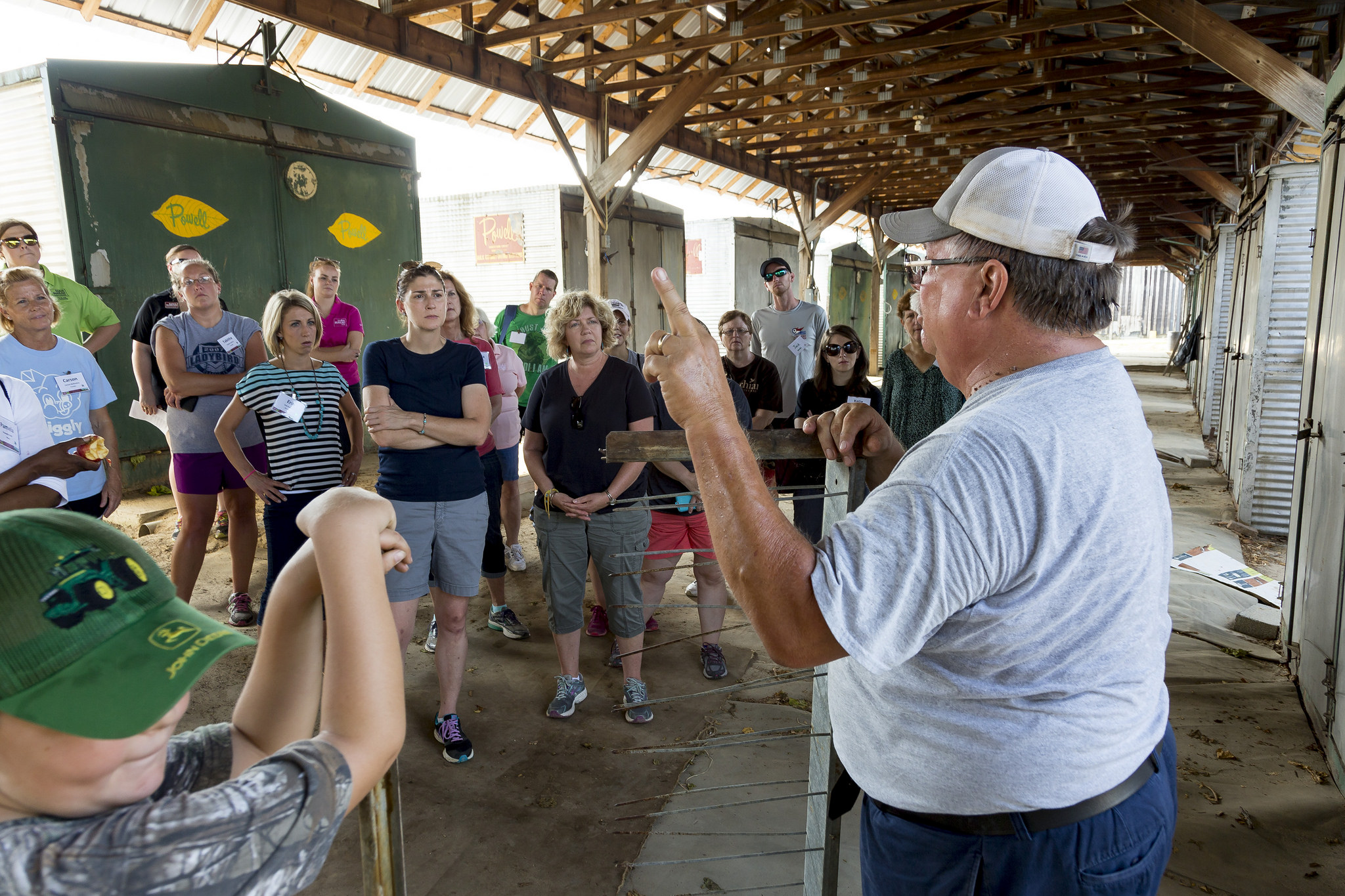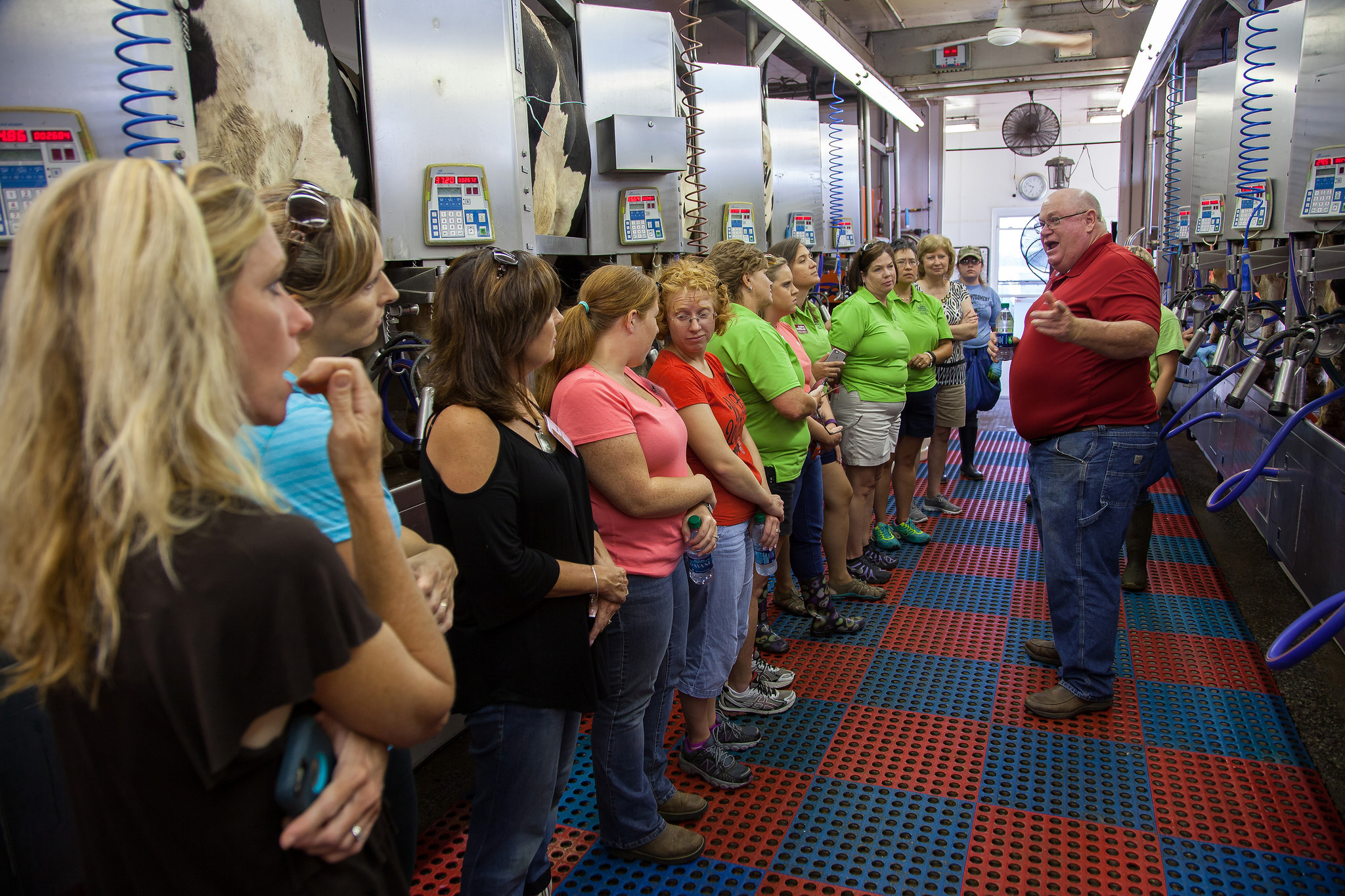Being a North Carolina Farm Bureau member has a lot of perks – discounts, scholarship opportunities, leadership development programs, and even the occasional educational trip. But there’s one program that you don’t have to be a member to enjoy the benefits, and that’s North Carolina Farm Bureau’s Ag in the Classroom program. (We talked about the program in detail last summer, so be sure to check out that post.)
Since the program’s beginning 32 years ago, we have endeavored to provide professional development workshops throughout the state for K-8 teachers. But over the years we’ve tried to shift our workshops away from a lecture format towards more of a hands-on, in-the-field learning experience. After all, if you have to earn Continuing Education Units (CEUs), wouldn’t you rather do it live on the farm instead of sitting in a classroom all day listening to hours and hours of lectured material?
 Enter our Going Local Workshop series. Every summer, these workshops are held directly on the farm and are a great way for teachers to gather materials, lesson plans, and current teaching methods to help show students where our food and fiber comes from locally.
Enter our Going Local Workshop series. Every summer, these workshops are held directly on the farm and are a great way for teachers to gather materials, lesson plans, and current teaching methods to help show students where our food and fiber comes from locally.
- Better than movie day: The workshops, led by AITC staff and highly-trained practicing educators, focus on student competency requirements with a concentration on STEM education. They help educators apply North Carolina state standards including science, math, language arts, and social studies in the context of agriculture. But they’re also fun and engaging! After attending a local workshop, an Alamance County teacher with more than 10 years of experience said, “I have attended many workshops over the years, but this was by far the best teacher workshop I’ve ever been to. The hands-on experience and the take home materials were amazing.”
I have attended many workshops over the years, but this was by far the best teacher workshop I’ve ever been to. The hands-on experience and the take home materials were amazing.
- Get acquainted with agriculture: From last summer’s workshops, 95% of participants agreed that their comfort level with teaching agricultural topics increased due to the workshop. One teacher who attended our workshop in Duplin County said, “The format of the workshop was innovative and exposed me to teaching strategies I can use in the classroom long-term. I never realized how easily agriculture can be utilized in all of what I teach.”
- We play well with others: We collaborate with county Farm Bureaus and local commodity groups to host workshops held on local farms. The day is filled with a tour of the farm where the workshop is hosted, guest speakers working in the agriculture industry, professional development by grade level in the afternoon, and meeting the volunteer leaders of the county Farm Bureau. Alamance County Farm Bureau President Vaughn Willoughby reported, “The AITC teacher workshop gave us an opportunity to give exposure to what agriculture is all about here locally. It also allowed teachers hands-on experience on the farm. But more importantly, it helped us build a bridge between the classrooms and modern day agriculture.”
- The world is your classroom: The working farm is a venue which provides nearly limitless learning opportunities. For example, did you know cows are herbivores; therefore, they only have teeth on the bottom of their mouths? Or did you know that one bale of cotton produces 313,600 $100 bills? By incorporating elements of farm life, our workshops try to inspire new ways of teaching familiar concepts. And each workshop is tailored to the top agricultural products grown locally, so the experience is relatable and translates naturally to the classroom.
 Each teacher who attends a workshop will receive a backpack full of materials and resources ready to use in their classrooms, a thumb drive filled with grade specific lesson plans, and .7 CEUs for updating teaching certifications – along with gaining a better understanding of how North Carolina farmers raise and produce our food and fiber. Below is a brief outline of our upcoming Going Local Workshops (registration is linked in each header).
Each teacher who attends a workshop will receive a backpack full of materials and resources ready to use in their classrooms, a thumb drive filled with grade specific lesson plans, and .7 CEUs for updating teaching certifications – along with gaining a better understanding of how North Carolina farmers raise and produce our food and fiber. Below is a brief outline of our upcoming Going Local Workshops (registration is linked in each header).
June 13th – Apple Hill Farm
400 Apple Hill Road
Banner Elk, NC 28604
Apple Hill Farm has been in operation for over 15 years. The farm started as a passion project for the owner, and now serves as a popular Agritourism destination, featuring alpacas, llamas, goats, and donkeys. The NCFB AITC team will focus on Christmas Trees, Family Farms, and Animal Fiber.
Registration closes June 1st.
June 27th – Wayne E. Bailey Produce Company & Chadbourn Elementary School
409 E 3rd Avenue
Chadbourn, NC 28431
Wayne E. Bailey Produce Company is a fourth generation family business. The farm started as a strawberry farm, but eventually the focus turned to sweet potatoes when president and owner George Wooten saw the potential for sweet potatoes to be marketed year-round. The NCFB AITC team will focus on Edible Roots, Strawberries and Family Farms.
Registration closes June 13th. This workshop will only accept 30 participants.
August 3rd – UNCW Fish Research Facility and Watson College of Education at UNCW
601 S College Road
Wilmington, NC 28403
The day will start with w tour of a fish research facility and will end with professional development at the Watson College of Education at UNCW. New Hanover County native, 2016-17 Kenan Fellow and NCFB AITC’s 2017 Teacher of the Year, Stephanie Titzel will join this workshop. The NCFB AITC team will focus on Bees, the Greenhouse/Nursery industry, and Aquaculture.
Registration closes July 20th.
August 8th – Byrd Farms
8136 US Highway 401 S
Bunnlevel, NC 28323
Byrd Farms began in the early 1900s. James Michael Byrd is a seventh generation farmer and farms alongside his parents, R.H. and Sherrie. R.H.’s grandfather served on the National Cotton Council in the early 1900s, and would often travel to Europe to participate in commodity training! The NCFB AITC team will focus on Cotton, Soybeans and Family Farms.
Registration closes July 28th.
August 10th – Wyant Farms
2847 Wyant Road
Vale, NC 28168
Wyant Farms is a fifth generation farm which began in the late 1800s. They specialize in wheat, soybean, corn, alfalfa, and cattle production. Jerry Wyant was named 2016 North Carolina Farmer of the Year. The NCFB AITC team will focus on Beef Cattle, Soybeans, and Family Farms.
Registration closes August 1st.
 Why are Going Local Workshops Important?
Why are Going Local Workshops Important?
Agriculture is North Carolina’s #1 economic driver, but only 2% of the population is directly connected to farming. We must create new ways to teach young people where their food and fiber comes from and how farming plays a central role in our lives. Plus, working in today’s agriculture isn’t just plowing the field and getting dirt under your fingernails; it’s researching plant and animal biochemestry, engineering cutting-edge technology, refining best practices to improve production or sustainability, and even developing public policy to support our farmers. These AITC Going Local Workshops provide more than just information – they build real world connections within local communities and help teachers cultivate a strong agriculture foundation in their students.
So use the HAPPENINGS tab from our website, www.ncagintheclassroom.org and sign up for one of our Going Local Workshops. We look forward to seeing you soon!
Michele Reedy is the Director of the North Carolina Farm Bureau Ag in the Classroom program.
